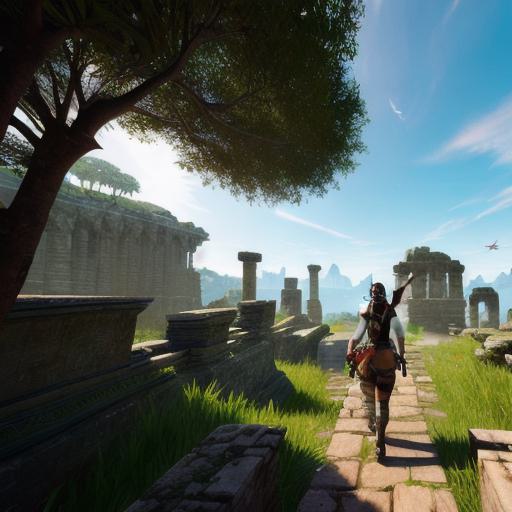Introduction
Game development has come a long way since its inception, with new technologies and techniques constantly emerging to make games more immersive, engaging, and innovative. In this article, we will explore the latest trends in game development and how they are shaping the future of gaming. From virtual reality (VR) and augmented reality (AR) to artificial intelligence (AI) and blockchain technology, these advancements are revolutionizing the way games are created, played, and experienced.
Virtual Reality and Augmented Reality
Virtual reality and augmented reality have been game-changers in the world of gaming, providing players with a new level of immersion that was previously unimaginable. VR technology allows players to completely immerse themselves in a virtual environment, where they can interact with the game world as if they were really there. This has led to some truly amazing experiences, such as exploring ancient ruins in "Tomb Raider" or flying through the skies in "Beat Saber."
Augmented reality, on the other hand, takes a different approach by overlaying digital content onto the real world. This technology has been used to create interactive games that blend the physical and virtual worlds, such as "Pokemon Go" and "Snapchat Lenses." The future of VR and AR in gaming is incredibly promising, with new technologies like 5G and 6G set to bring even more immersive experiences to life.
Artificial Intelligence
Artificial intelligence has been a major focus in the game development industry over the past few years, and it shows no signs of slowing down. AI can be used to create incredibly realistic characters that exhibit complex emotions and behaviors, as well as intelligent enemies that adapt to the player’s tactics. Games like "The Witcher 3" and "Red Dead Redemption 2" are great examples of games that have successfully implemented AI to enhance their gameplay.

However, the use of AI in gaming is not without its challenges. There are concerns around the ethical implications of creating intelligent non-player characters (NPCs), as well as the potential for AI to replace human jobs in the industry. Despite these challenges, the potential benefits of AI in gaming are enormous, and we can expect to see even more innovative uses of this technology in the future.
Blockchain Technology
Blockchain technology has been a major disruptor in many industries, including gaming. By using blockchain, developers can create secure and transparent systems that allow players to own their in-game assets and track their progress. This has led to the rise of non-fungible tokens (NFTs), which have already been used to sell unique items like digital artwork and collectibles.
The use of blockchain technology in gaming also opens up new possibilities for player-to-player transactions, as well as the creation of decentralized gaming platforms that are resistant to censorship and manipulation. While the technology is still in its early stages, there is no doubt that it will play a major role in shaping the future of gaming.
Summary
The world of game development is constantly evolving, with new technologies and techniques emerging all the time. From VR and AR to AI and blockchain, these advancements are changing the way games are created, played, and experienced. While there are certainly challenges associated with these developments, the potential benefits are enormous, and we can expect to see even more innovative uses of technology in gaming in the future. So whether you’re a developer or just a gamer, it’s an exciting time to be part of the world of gaming.
FAQs
- What is virtual reality (VR)?
Virtual reality is a technology that allows players to immerse themselves in a virtual environment, where they can interact with the game world as if they were really there. - What is augmented reality (AR)?
Augmented reality is a technology that overlay digital content onto the real world, creating interactive games that blend the physical and virtual worlds. - How does artificial intelligence (AI) affect game development?
Artificial intelligence can be used to create incredibly realistic characters that exhibit complex emotions and behaviors, as well as intelligent enemies that adapt to the player’s tactics. - What is a non-fungible token (NFT)?
A non-fungible token is a unique digital asset that can be bought, sold, and traded on blockchain technology. - How will blockchain technology shape the future of gaming?
Blockchain technology allows for secure and transparent systems that allow players to own their in-game assets and track their progress, as well as new possibilities for player-to-player transactions and decentralized gaming platforms.
